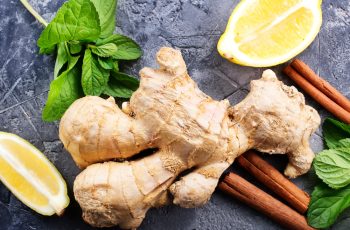Ad Blocker Detected
Our website is made possible by displaying online advertisements to our visitors. Please consider supporting us by disabling your ad blocker.
Several (super) foods can contribute to improving gut health and reducing inflammation. Including the following in your diet may be beneficial:
- Fibre-rich foods: High-fibre foods, such as fruits, vegetables, whole grains, legumes, and nuts, are excellent for gut health. They provide prebiotic fibre, which serves as food for beneficial gut bacteria, promoting their growth and diversity.
- Fermented foods: Fermented foods like yogurt, kefir, sauerkraut, kimchi, and kombucha contain beneficial probiotics that support a healthy gut microbiota. Probiotics help maintain the balance of gut bacteria and can have anti-inflammatory effects.
- Omega-3 fatty acids: Foods rich in omega-3 fatty acids, such as fatty fish (salmon, mackerel, sardines), walnuts, flaxseeds, and chia seeds, have anti-inflammatory properties. They can help reduce inflammation in the gut and throughout the body.
- Ginger and turmeric: These spices have been shown to possess anti-inflammatory properties. Incorporating fresh ginger or turmeric into your meals or consuming them as teas can help reduce gut inflammation.
- Olive oil: Extra virgin olive oil contains beneficial compounds, such as polyphenols, that have anti-inflammatory effects. It is a healthy choice for cooking and salad dressings.
- Leafy greens: Vegetables like spinach, kale, Swiss chard, and collard greens are rich in nutrients and antioxidants. They provide fibre and help promote a healthy gut environment.
- Berries: Berries, such as blueberries, strawberries, and raspberries, are packed with antioxidants and fibre. They can help reduce inflammation and support gut health.
- Bone broth: Homemade bone broth made from simmering animal bones and connective tissue contains collagen and amino acids that support gut integrity and may reduce inflammation.
- Green tea: Green tea is rich in polyphenols that have anti-inflammatory properties. It can contribute to a healthy gut environment.
- Dark chocolate: Dark chocolate with a high cocoa content (70% or more) contains antioxidants and flavonoids that have anti-inflammatory effects. Enjoying moderate amounts can be beneficial for gut health.
It’s important to note that individual responses to these foods may vary, and it’s best to consider your unique dietary needs and any specific health conditions. A well-rounded and varied diet that includes whole, unprocessed foods is generally recommended for maintaining gut health and reducing inflammation.
Further reading
- “The Role of Diet in Gut Microbiota and Health” by Cani et al. (2018) in the journal Nature Reviews Gastroenterology & Hepatology. This review article discusses the role of diet in shaping the gut microbiota and how this can impact health. https://pubmed.ncbi.nlm.nih.gov/29605052/
- “Dietary Interventions to Improve Gut Microbiota for Health” by Versalovic et al. (2019) in the journal Nature Microbiology. This review article discusses the potential benefits of dietary interventions for improving gut microbiota and health. https://pubmed.ncbi.nlm.nih.gov/30804653/
- “The Effects of Diet on the Gut Microbiota and Its Role in Human Health” by De Filippo et al. (2010) in the journal Nutrition Reviews. This review article discusses the effects of diet on the gut microbiota and how this can impact health. https://pubmed.ncbi.nlm.nih.gov/20450896/
- “The Gut Microbiota and Its Role in Human Health and Disease” by Turnbaugh et al. (2009) in the journal Nature. This review article discusses the role of the gut microbiota in human health and disease. https://pubmed.ncbi.nlm.nih.gov/19307997/
- “The Gut Microbiome: A New Frontier in Human Health” by Peterson et al. (2016) in the journal Cell Host & Microbe. This review article discusses the gut microbiome and its role in human health. https://pubmed.ncbi.nlm.nih.gov/27005753/


